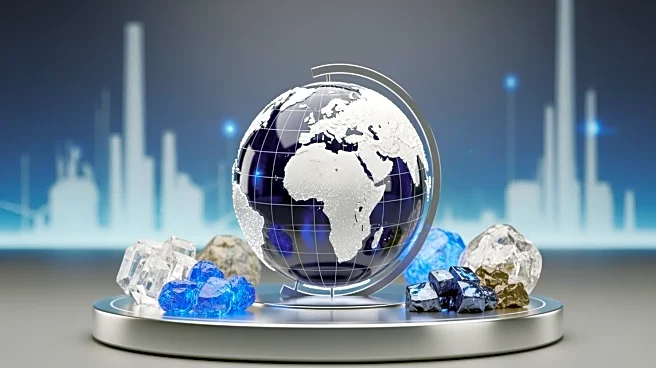What's Happening?
President Donald Trump and Japanese Prime Minister Sanae Takaichi have signed a framework agreement to cooperate on critical minerals and rare earths. This agreement aims to reduce the United States' dependency on China for these essential materials,
which are used in various technologies, including cellphones and jet engines. The signing took place at Akasaka Palace in Tokyo, marking a significant diplomatic engagement for Takaichi, who was recently appointed as Japan's prime minister. The agreement comes ahead of Trump's scheduled meeting with Chinese leader Xi Jinping in South Korea, where discussions will focus on stabilizing economic relations following a prolonged trade war. China has recently announced plans to expand export restrictions on rare earth minerals, which has heightened the urgency for the U.S. to secure alternative sources.
Why It's Important?
The agreement between the U.S. and Japan is crucial in the context of global supply chain security and geopolitical dynamics. By reducing dependency on China for critical minerals, the U.S. aims to enhance its strategic autonomy and mitigate risks associated with supply chain disruptions. This move is part of a broader strategy to strengthen alliances in the Indo-Pacific region, including partnerships with Australia and Malaysia. The deal also reflects Japan's commitment to increasing defense spending and investing in the U.S. economy, which could lead to significant economic benefits for both countries. The collaboration underscores the importance of securing reliable sources of critical minerals, which are vital for technological advancements and national security.
What's Next?
President Trump is set to meet with Chinese leader Xi Jinping in South Korea to discuss economic relations and seek a reprieve from China's mineral export restrictions. The outcome of this meeting could influence future trade policies and diplomatic relations between the U.S. and China. Additionally, Japan's increased defense spending and investment in the U.S. may lead to further economic and military collaborations. The agreement could also pave the way for more comprehensive partnerships in the Indo-Pacific region, as countries seek to counterbalance China's influence. The U.S. and Japan may continue to explore additional areas of cooperation, including technology and security.
Beyond the Headlines
The agreement highlights the strategic importance of critical minerals in global politics and economics. It raises questions about the ethical and environmental implications of mining and processing these materials. As countries seek to secure their supply chains, there may be increased scrutiny on the sustainability and environmental impact of mineral extraction. The deal also reflects the shifting dynamics in U.S.-Asia relations, with Japan emerging as a key ally in countering China's economic and military rise. The collaboration could lead to long-term shifts in trade policies and geopolitical alliances, influencing global power structures.

















